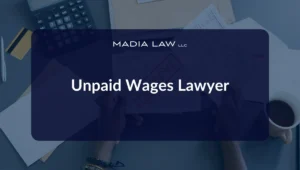
You’re likely dealing with the stress of missing paychecks, unpaid overtime, or illegal deductions if you’re searching for an unpaid wages lawyer near Minneapolis, MN.
At Madia Law, we’ve spent over 15 years helping workers across Minnesota recover lost wages, stop wage theft, and stand up for their employee rights. Whether your employer denied overtime, misclassified your job, or retaliated after you spoke up, we work to get your money back and hold them accountable.
Our firm focuses exclusively on employment law and wage recovery cases. We know Minnesota and federal wage laws inside and out. Our wage theft attorneys in Minneapolis handle cases involving wage theft, unpaid bonuses, overtime violations, misclassification, and final paycheck disputes, and we only get paid if you win.
What Are My Employee Rights Under Minnesota and Federal Law?
Minnesota law and the Fair Labor Standards Act (FLSA) work together to protect your earnings, but they’re not identical. Federal law sets the national floor for protections, but Minnesota often provides stronger employee wage rights, including higher minimum wages and specific break requirements.
Under both Minnesota labor laws and the Fair Labor Standards Act (FLSA), employees are legally entitled to:
- Minimum wage
- Overtime pay
- Rest and meal breaks
- Timely final pay after termination
Minnesota vs. Federal Laws: Key Differences
Minnesota laws often provide stronger protections for workers than federal law, especially in areas like wages and breaks. Here’s how Minnesota labor laws vs Federal laws compare across wage thresholds, overtime rules, break policies, and more.
| Legal Area | Federal Law | Minnesota Law |
|---|---|---|
| Minimum Wage | $7.25/hour | $10.85/hour (large employers) |
| Overtime | 1.5x after 40 hrs/week | 1.5x after 48 hrs/week (state); 40 hrs (FLSA) |
| Meal Breaks | No specific requirement | 20-minute unpaid for 8+ hr shifts |
| Rest Breaks | No requirement | Reasonable restroom breaks as required |
| Final Paycheck | No specific timeline | Due within 24–48 hours of termination |
Independent Contractor vs. Employee Classification
The difference between independent contractor and employee classification lies in control, independence, and legal protections. It determines your legal rights in the workplace. Employees are entitled to protections under federal and Minnesota labor laws, including minimum wage, overtime pay, unemployment benefits, and workers’ compensation. Independent contractors are not.
If your employer controls your schedule, provides the tools or equipment you use, and your work is central to the business, you’re likely an employee under the law—even if you’re being called a contractor. This misclassification is a serious issue in Minnesota and denies you overtime, minimum wage, and other protections you’ve earned. Courts use several legal tests, including the economic realities test and the IRS 20-factor test, to determine a worker’s true status.
If you’ve been misclassified, you may be a victim of wage theft, and you could be entitled to back pay, unpaid overtime, and other compensation.
When is Overtime Pay Legally Required in Minnesota?
Under Minnesota overtime law (Statue § 177.23), you’re entitled to overtime pay if you:
- Work more than 40 hours in a week (Federal Standard)
- Are a non-exempt employee under the FLSA
Hourly workers almost always qualify. Salaried employees have higher chances of qualifying unless they meet strict exemption criteria. For example:
- Restaurant servers often qualify for overtime.
- IT professionals earning below the FLSA threshold likely do, too.
Employee Misclassification & Wage Theft Explained
Employee misclassification is one of the most common ways wage theft happens, and it often goes unnoticed until workers start asking the right questions. When you’re labeled an independent contractor but treated like an employee, it can lead to unpaid overtime, missed breaks, and denied benefits you’re legally entitled to.
In Minnesota, wage theft isn’t just unfair – it’s illegal. Under Minnesota Statute § 181.03, wage theft includes:
- Not paying earned overtime
- Misclassifying employees as independent contractors
- Denying legally required meal and rest breaks
- Delaying or withholding final paychecks
If any of this sounds familiar, you may have a claim. You have the right to be paid fairly for your work and to hold your employer accountable when they break the law.
Can My Employer Say I’m Exempt From Overtime?
Your employer cannot decide on an exemption based only on job title or salary. To legally classify a worker as exempt from overtime under the Fair Labor Standards Act (FLSA), two things must be true:
- You must earn at least $684 per week (as of current federal law).
- Your job duties must fall under specific exemptions, such as executive, administrative, or professional roles.
You are likely non-exempt if you are salaried but perform routine, manual, or clerical work without independent judgment. Mislabeling you as exempt is wage theft and is subject to penalties.
How Misclassification Results in Wage Theft?
The Minnesota Department of Labor and Industry (DOLI) identifies misclassification as one of the leading causes of wage theft complaints across the state. When employers misclassify workers as independent contractors instead of employees, they often avoid legal obligations, resulting in wage theft. This practice can lead to:
- Unpaid overtime: Employers avoid paying time-and-a-half for hours worked beyond 40 per week.
- No meal or rest breaks: Misclassified workers are often denied break periods required under Minnesota law.
- Denied benefits: Workers miss out on health insurance, paid leave, unemployment, and workers’ compensation.
- Out-of-pocket expenses: Misclassified workers cover their own tools, equipment, or travel costs.
- No payroll tax contributions: Employers avoid paying their share of Social Security, Medicare, and unemployment taxes.
Class Actions and Collective Actions for Wage Claims
When multiple employees suffer the same wage violations, the law allows group lawsuits:
- A class action combines employee claims under state law.
- A collective action (under the FLSA) lets workers opt-in to pursue federal wage violations.
These actions often succeed when large companies violate pay laws, such as in warehouse or call center cases.
What is a Class Action?
A class action combines similar individual claims into one lawsuit under state labor laws. Benefits include:
- Shared legal expenses
- Stronger negotiation power
- Consistent outcomes for all plaintiffs
What Is Collective Action Under the FLSA?
A collective action allows employees to pursue federal wage law violations, like unpaid overtime or minimum wage issues, under the FLSA. Class actions are opt-out; collective actions are opt-in only. This means, unlike a class action, you’re not included if you don’t opt in, and you keep the right to file your separate claim.
All affected employees must have similar job roles and claims in this case. Likewise, the court must approve the case as a valid collective action under the FLSA.
Why File as a Group? Advantages of Legal Collective Actions
Filing as a group strengthens your case and increases your chances of recovery. The 6 key benefits of filing an unpaid wages lawsuit as a group include:
- Lower legal costs per worker
- Stronger leverage in negotiations
- Reduced fear of retaliation
- Unified strategy and evidence
- Faster legal resolutions
- Consistent outcomes for everyone
How Do I Prove Wage Theft or Unpaid Overtime?
You can prove a wage theft or unpaid overtime claim even if you don’t have exact time records. If you can give a reasonable estimate of the hours you worked, supported by documents like emails, schedules, pay stubs or witness statements, that’s often enough to move your case forward.
Once you’ve made a credible estimate, the burden shifts to your employer to prove that you were paid correctly.
How to Prove a Wage Theft Case Without Time Records
You can use personal and third-party sources to prove your work hours if your employer failed to keep proper records. Courts recognize that workers may need to rely on alternative evidence, such as:
- Phone logs showing work-related calls or messages during typical shift hours
- Email timestamps confirming job-related communication
- Delivery records or GPS data that track your movements while on the clock
- Invoices or receipts connected to work you performed
- Personal notes or calendars where you recorded your hours
What Types of Evidence Help Your Claim?
The six types of strongest evidence in wage claims include:
- Pay stubs or direct deposit records
- Bank deposits that don’t match promised wages
- Emails or texts confirming shift times or job duties
- Coworker statements verifying your schedule
- Punch card or timekeeping system data
- Photos, videos, or shift rosters showing your presence at work
Why Reconstructing Work Hours Matters
Courts allow you to reconstruct hours from other sources when timecards are missing or inaccurate. This creates a legal presumption that your estimate is correct. The Minnesota Department of Labor and the FLSA support reconstructed time as valid evidence in wage theft cases.
Can Missed Breaks Be Considered Wage Theft?
Missed breaks can be considered wage theft if your employer denies a legally required break. Under Minnesota law:
- You must receive a meal break if you work eight hours or more
- You must be allowed restroom breaks as needed
- Breaks must be free of work duties
These missed breaks legally qualify as underpayment under both state law and the Fair Labor Standards Act (FLSA).
Rest and Meal Break Rules in Minnesota
Minnesota labor law requires employers to provide:
- A meal break of at least 20 minutes during shifts 8 hours or longer
- Bathroom breaks as needed throughout the shift
- Uninterrupted, duty-free break time
Federal law does not guarantee meal or rest breaks, but Minnesota law fills this gap with clear protections.
Employers who fail to provide these breaks violate Minn. Stat. § 177.253 and Minn. Rules 5200.0120.
Missed Breaks as Part of Wage Theft
When employers deny required break time, they benefit from free labor, resulting in illegal underpayment. These common workplace examples qualify:
- Restaurant workers expected to serve customers straight through 10-hour shifts without a meal break
- Warehouse employees packing and loading without any time for rest
- Call center agents told to clock out but stay at their desks answering calls
These situations lead to lost wages and may qualify for back pay and penalties under Minnesota wage theft laws.
Handling Illegal Deductions & Final Paycheck Disputes
Under Minnesota labor law, employers are prohibited from making unauthorized deductions from your wages. Additionally, they cannot withhold or delay your final paycheck after separation.
Violating these rules results in penalties, damages, and legal fees owed to the employee. These issues fall under wage theft claims governed by Minn. Stat. § 181.79 and § 181.13.
What to Do if Employer Takes Unlawful Deductions?
It is illegal to make deductions from your paycheck for items like uniforms, cash register shortages, or equipment damage without written consent under Minnesota law.
Here’s what you should do if your employer has made unlawful deductions from your paycheck.
- File a complaint with the Minnesota Department of Labor and Industry (DOLI)
- Consult a wage and hour attorney to evaluate your case
- File a lawsuit, if needed, to recover wages and damages
Recovering Final Pay After Termination
Under Minnesota law:
- Your final wages are due within 24 hours after you demand them if you quit.
- Your final wages are due within 48 hours if you are fired or laid off.
Employers have a higher chance of paying daily penalties (up to 15 days of wages), full unpaid wages, and legal costs and attorney fees if they miss these deadlines. These rules apply to all employees, regardless of whether you are paid hourly or salaried.
Compensation & Damages in Wage Theft Claims
Minnesota law entitles you to recover more than unpaid wages if your employer has committed wage theft. You may be eligible for:
- Back pay for all unpaid wages and overtime
- Double damages (2x the amount owed) under Minn. Stat. § 181.13 and § 181.14
- Attorney’s fees and court costs
- Interest on unpaid wages
- Additional penalties for retaliation or bad faith
How Much Can You Recover?
Under Minnesota’s Wage Theft Law, the amount you can recover varies greatly, from $10,000 to $100,000 or more, which includes:
- 2 times the amount of unpaid wages (100% back pay + 100% in liquidated damages) under Minn. Stat. § 181.13 and § 181.14
- Full reimbursement of legal costs
- Additional civil penalties if your employer retaliated against you
Statute of Limitations for Wage Theft Claims
In Minnesota, your time to file a wage claim depends on intent:
- 2 years for standard wage violations
- 3 years if the employer acted willfully or knowingly
The statute of limitations starts from the date of your last unpaid paycheck, not the first time it happened. Missing the deadline can result in losing your right to recover wages. Don’t wait. Speak with our wage and hour attorney as soon as possible to protect your rights and avoid missing your window to file.
Protections From Retaliation for Reporting Wage Theft
It is illegal for an employer to retaliate against you for:
- Asking about or asserting your right to unpaid wages
- Filing a wage theft complaint
- Participating in a labor investigation or legal proceeding
These protections are guaranteed under Minnesota Statute § 181.932 and the Fair Labor Standards Act (FLSA). Retaliation can include firing, demotion, pay cuts, schedule changes, or threats.
You have the legal right to speak up about wage violations without fear of punishment.
Can My Boss Fire Me for Filing a Wage Complaint?
No. Your boss cannot fire, discipline, or threaten you who report wage violations. Under Minn. Stat. § 181.932 and the FLSA anti-retaliation provisions, this conduct is prohibited retaliation.
Your employer will be liable for the following if you are terminated or harassed after making a complaint:
- Lost wages
- Reinstatement
- Compensatory damages
- Punitive damages
- Legal fees
Steps to Take If Retaliation Happens
- Submit a written report to your employer’s HR department (if it is safe to do so)
- File a complaint with the Minnesota Department of Labor and Industry (DOLI)
- Contact a wage and hour attorney to review your retaliation case
Contact Our Minnesota Wage Theft, Overtime & Class Action Lawyers
We can help if you are missing wages, denied overtime, or facing retaliation. Madia Law is a trusted unpaid wages law firm in Minneapolis, Minnesota, with over 15 years of experience fighting for workers’ rights. Call us today or request a case review. Your paycheck is your right. Let us fight to get it back.




